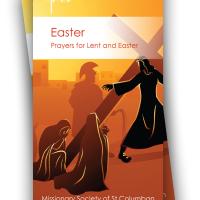From Pakistan and unable to return to Rome, Fr Robert McCulloch participated in an international webinar on 'The Church's Response to COVID-19 Global Crisis: Pastoral and Management Challenges.
Read an edited version of his address.

Webinar flyer. Photo: Program of Church Management
I have been asked to speak on church management and social issues in the response of Catholic healthcare to the coronavirus crisis in Pakistan, and then to consider some wider projections emerging for church administration and congregational leadership through their response to the crisis.
I am now in lockdown at St Elizabeth Hospital in Hyderabad Pakistan. I arrived for two days of donor finance meetings on March 12-13. There were then 2 recorded virus cases in Pakistan. I stayed for a week in Lahore to work on the Urdu translation of the Roman Missal. By the end of the week, all public transport had been cancelled, airports were closed and international flights cancelled. Most of the country is under military curfew from 5 pm-9 am. There is lockdown for the rest of the day. As of April 6 evening, there are 3,278 confirmed cases.
Some background issues:
- Because there is no national Catholic healthcare coordinating organization in Pakistan, there is no collaboration between Catholic healthcare services in responding to the crisis.
- For the same reason, there is no coordinated response by Catholic healthcare services in Pakistan to the initiatives and directives of the federal and provincial governments.
- Outpatient departments in all hospitals have been closed by government order. This has caused another medical crisis, i.e. the unavailability of medical care for non-virus patients and sick people.
- As in many other countries, there is a shortage of protective equipment for medical and nursing personnel.
- Medical advice about self-protection, self-isolation, and maintaining lockdown in Hyderabad and probably elsewhere conflicts with religious insistence to the contrary, public unconcernedness, and illiteracy.
The medical crisis is causing a huge social crisis in Pakistan. 40% of workers are daily wage earners. Due to curfew and lockdown, they have no work to support and feed their families. Prime minister Imran Khan last Thursday worried publicly on national media about this social crisis of hunger and starvation.

Screenshot of Webinar on The Church's Response to Covid-19 Global Crisis. Photo: Youtube: Program of Church Management
Other organizations have closed and dismissed staff without salary and employment assurance. St Elizabeth Hospital is working to adjust meagre cash sources to avoid this and the crisis it would cause in families. But for how long this can be done is the worrying question.
Unfortunately, there is clear evidence that some Islamic aid organizations are refusing to assist non-Muslims on the basis that their aid comes from zakat1 so can only be used for Muslims. International donor organizations and governments must carefully monitor the distribution of any crisis aid they provide.
St Elizabeth Hospital is reasonably well-prepared to deal with the medical crisis. It is the only hospital in Hyderabad with an active and effective Infection Control Department led by trained and qualified personnel, one of whom did a clinical attachment in infection control at Cabrini Hospital Melbourne Australia in 2015.
The hospital’s home-based palliative care nurses are on call 24-hours for all the stage 3 and 4 cancer patients and are regularly visiting stage 1 and 2 patients who are under lockdown and need support, treatment and maintenance. This is not happening anywhere else in Pakistan. The military and police permit the palliative care nurses to move in spite of curfew and lockdown.
Internationally, church administration and congregational leadership are responding to this crisis on human and institutional levels. If this has been a genuine learning process, then significant permanent changes in overall ongoing church management will be evident.
The leaders of religious congregations and societies of apostolic life are dealing with the effects on their members, on the way they interact and guide their membership, and on their national and international ministries. This should be an effective learning process, leading to a more mobile, online, less-centralized structure of leadership and governance.
On an emergency basis, Vatican dicasteries have moved into new online modalities of work during this crisis which does not seem to have a quick foreseeable end. It would be a wasted learning experience for the dicasteries facilely to revert to “as it was”.
After the crisis eases, the Church’s full attention must be the pastoral care of the faithful who struggle in grief and dislocation and in pastoral need. Pope Francis gave this example as he stood alone in the rain in front of St Peter’s while giving the Urbi et Orbi blessing.
Fr Robert McCulloch SSC,
Procurator-General, Missionary Society of St Columban
1- zakat: a tax, comprising percentages of personal income of every kind, levied as almsgiving for the relief of the poor: the third of the Pillars of Islam
Related links
- Read more from the current Columban eBulletin
- Watch the full Webinar on The Church's Response to COVID-19 Global Crisis

